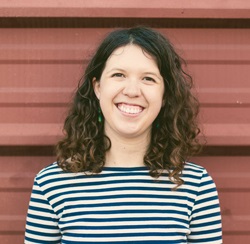- About Archives
- About SAA
- Careers
- Education
- Publications
- Advocacy
- Membership

Professional Experience: Digital Archivist/Records Manager, Archives and Rare Books Library, University of Cincinnati, 2013–present. Library Associate, Louisiana Research Collection, Tulane University, 2010–2013; Library Technician, Louisiana Research Collection, Tulane University, 2008–2010.
Education: MLIS, San Jose State University, 2012. BA, Geography, University of Cincinnati, 2008.
Professional Activities: Society of American Archivists (SAA): 2013 Host Committee, Local Blogger, 2012–2013; Communications Task Force, 2012–2013; San Jose State University SAA Student Chapter, Chair, 2010–2011. Academy of Certified Archivists (ACA): Certified Archivist, 2013. Society of Southwest Archivists (SSA): 2014 Annual Meeting Local Arrangements Committee, August–November 2013; Recipient of Meeting Scholarship, 2012. Greater New Orleans Archivists: Webmaster, 2012–2013. Louisiana Historical Association: Archives and Records Committee, 2012–2013.
Presentations: Building Better Bridges: Archivists Cross the Digital Divide (Chair), Society of American Archivists annual meeting, 2013. “Vendors and Legacy Finding Aid Migration,” presented as part of the session Hybrids and Legacies: Challenges of Finding Aids in the Digital Age (Chair and Presenter), Society of American Archivists annual meeting, 2012. “Migration of Legacy Finding aids to the Web,” Louisiana Archives and Manuscripts Association annual meeting, 2011. “Legacy Finding Aid Project at the Louisiana Research Collection,” Graduate Student Poster Session, Society of American Archivists annual meeting, 2011. “When All the Finding Aids Exist Only in Binders: Implementing Archon the Quick and Dirty Way,” presented as part of the session Providing Better Access to Our Collections, Southern Archivists Conference, 2010.
***
Question posed by Nominating Committee: Define your vision of diverse leadership for SAA and describe how you would select candidates to make this vision a reality.
Working toward a diverse leadership for SAA starts much earlier than identifying current members for opportunities—it begins before someone joins SAA, by establishing a foundation to attract a diverse constituency to the profession in the first place. It is vital to recognize the role that newer members of the profession play, particularly as students comprise as many as 1 in 5 SAA members. According to the most recent SAA member survey, nearly 40% of respondents have been members for 3 years or less. Creating pathways to leadership for new members of the profession is essential to SAA’s continued success, to ensure that the association represents the interests and needs of its members, and to fulfill its mission to “. . . [promote] the value and diversity of archives and archivists.”
SAA’s recent partnership with ARL to expand the Mosaic Program for the recruitment of archivists from underrepresented racial and ethnic minority groups is a significant achievement. The large number of applications for this year’s cohort is encouraging, and suggests that future recruitment efforts will continue to be successful. Initiatives such as the Mosaic Program are essential to identifying future SAA leaders.
One of the major strategies in SAA’s recently adopted Strategic Plan calls for “[Continuing] to enrich the association and the profession with greater diversity in membership and expanded leadership opportunities” (4.3). The proposed actions underpinning these goals include working with several committees and roundtables within SAA. Working with these groups is an important and effective means of identifying potential candidates for the 2015 ballot. In addition, SAA leadership should reflect the wide range of archival practice, and include archivists from religious, corporate, tribal, government, academic, museum, and historical archives, as well as consultants and archival educators.
A major key to achieving diversity is being inclusive of the multiple generations represented within SAA, as well as the lengths of time individuals have been in the profession. New archivists often arrive with significant experience from another field, career, or graduate research, and we benefit enormously from the transferable skills they bring to the association. SAA should also continue to honor and build on the experience and institutional knowledge found among long-term members of the profession.
The Nominating Committee plays a major role in shaping the leadership of SAA. I will work to identify candidates of all backgrounds who are committed to creating a more inclusive SAA for new members and those from underrepresented groups.